Preparing Your Bad House for Sale
Selling a house that has seen better days can be a daunting task. However, with a little effort, you can attract potential buyers and successfully sell your bad house. Here is a list of things you can do to prepare your bad house for sale:
Clean and Declutter
A dirty and cluttered house can be a major turn off for potential buyers. Start by getting rid of any unwanted items and clutter in your house. You can donate or sell items that are still in good condition. Next, deep clean your house. This includes cleaning every nook and cranny of your house, washing walls, windows, and floors. If you can’t do this yourself, consider hiring professionals to help you.
Make Minor Repairs
Fixing minor repairs can help improve the overall look of your house and attract potential buyers. These repairs may include replacing light fixtures, fixing leaks, or replacing broken cabinets. Addressing these issues can go a long way in making your bad house look appealing to potential buyers.
Upgrade Your Curb Appeal
First impressions matter, and your home’s exterior is the first thing potential buyers will see. Make sure your home’s curb appeal is attractive by upgrading your home’s landscaping, painting exteriors, and cleaning up your yard. Consider hiring a professional landscaper to help you with this.
Negotiating the Sale
Once you’ve prepared your bad house for sale, the next step is to negotiate the sale. Here are some tips for negotiating the sale of your bad house:
Price Your House Correctly
Pricing is key when it comes to selling a bad house. Overpricing your house can cause it to sit on the market for months, or even years. To avoid this, research the real estate market in your area, and compare your house to similar houses in your area. Once you’ve done this, set a realistic price that reflects the condition of your bad house.
Be Honest in Your Disclosures
When selling a bad house, it’s important to disclose all issues with potential buyers. Hiding issues may lead to legal issues and prolong the sale process. If you’re upfront about the issues with your house, it can help build trust with potential buyers.
Offer Incentives
Incentives can help attract potential buyers to your bad house. Consider offering incentives such as a home warranty, closing cost credit, or offering to pay for repairs or upgrades. These incentives can help sweeten the deal for potential buyers.
Exploring Other Selling Options
If after preparing your bad house for sale, you still can’t find a buyer, exploring other selling options can be a great choice. Here are some options to consider:
Selling to a Real Estate Investor
Real estate investors often buy bad houses in any condition, and they can close the sale quickly. This option may be suitable if you need to sell your bad house quickly and don’t want to go through the traditional selling process.
Leasing to Own
This option may be suitable for those who can’t sell their bad house but need to move for a job or other reasons. Leasing to own allows you to lease your house to a buyer, who then has an option to purchase the house after a specified period.
Consider Renting
Renting out your bad house can be a good solution if you don’t want to sell your house but need to generate some income. However, this option requires maintenance, and you’ll need to be a responsible landlord.
Conclusion
Selling a bad house may take more effort than selling a move-in ready house, but with a little effort, you can still attract potential buyers and sell your house. Remember to prepare your bad house for sale, price it correctly, and consider all your selling options. Good luck!
